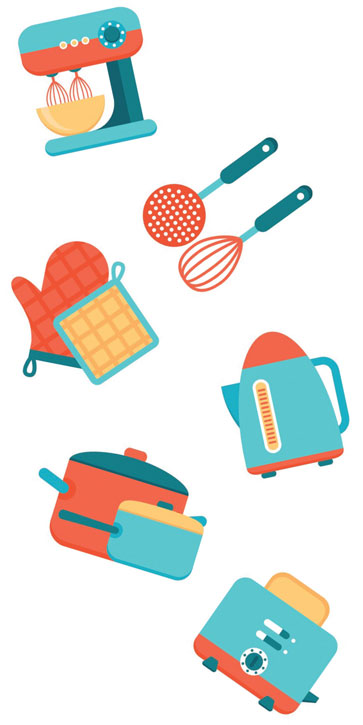By Julie Entwistle
The kitchen is the hub of every home—a place to cook and entertain, and where people spend a considerable amount of time. However, it can also be one of the most dangerous rooms in any home. Occupational therapists are skilled at helping people with disabilities function as safely and independently as possible in their living spaces, but also play a significant role in preventing disability in the first place. Here are some tips, pointers and things to consider that will make the process of meal preparation as safe as possible:
 A critical safety concern in the kitchen is forgetting to turn off the oven or stovetop. It is important to always stay nearby when food is cooking. Using a timer or alarm can be a helpful memory aid; a visual reminder, such as a checklist of tasks to be completed in the kitchen (that includes turning off the oven) or a sign in an easy-to-see location can also be useful. If there are cognitive concerns, a Stove Guard can be installed; it will automatically turn off after a pre-determined amount of time if it does not detect movement in the kitchen. If you must leave the kitchen area for any reason while cooking (e.g., to answer the phone or the door), wear an oven mitt or carry a kitchen utensil to serve as a visual reminder to get back to the kitchen as soon as you can. When using the oven, always wear long-sleeved oven mitts to avoid burns. Slow cookers are an easy and safe alternative to using the stovetop when preparing meals, and can also save you time and energy by allowing you to cook enough
A critical safety concern in the kitchen is forgetting to turn off the oven or stovetop. It is important to always stay nearby when food is cooking. Using a timer or alarm can be a helpful memory aid; a visual reminder, such as a checklist of tasks to be completed in the kitchen (that includes turning off the oven) or a sign in an easy-to-see location can also be useful. If there are cognitive concerns, a Stove Guard can be installed; it will automatically turn off after a pre-determined amount of time if it does not detect movement in the kitchen. If you must leave the kitchen area for any reason while cooking (e.g., to answer the phone or the door), wear an oven mitt or carry a kitchen utensil to serve as a visual reminder to get back to the kitchen as soon as you can. When using the oven, always wear long-sleeved oven mitts to avoid burns. Slow cookers are an easy and safe alternative to using the stovetop when preparing meals, and can also save you time and energy by allowing you to cook enough
for more than one meal.
There are many simple ways to make your life easier in the kitchen, especially if you are dealing with a physical limitation or disability. For individuals with decreased grip strength, rubber tubing can be applied to utensils to provide a larger and easier grip. To improve motor control when eating, weighted utensils can be tried, non-slip mats or suction cups can be placed underneath plates or cups to prevent slipping, and scoop plates or food guards can assist with getting items from the plate to fork or spoon. For individuals with functional use of only one hand, rocker knives can enable them to cut food. Adapted utensils with a variety of handles and utensil sizes can also make it easier to eat independently. Speak with your occupational therapist to determine which utensils are best suited for your individual needs.
It is important to conserve your energy so you have energy left to do the things you enjoy doing. If meal preparation is important to you but energy is a precious resource, the following tips can be helpful.
• First and foremost, never be afraid to ask for help for some parts of a larger task. For example, have someone else set out all of the necessary supplies ahead of time so you can focus your energy on the food preparation.
of a larger task. For example, have someone else set out all of the necessary supplies ahead of time so you can focus your energy on the food preparation.
• Plan ahead to minimize unnecessary tasks and to give yourself enough time for rest periods. Work at a mild to moderate pace—rushing consumes energy!
• Sit whenever possible to prepare meals and wash dishes, and consider using a perching tool to provide those rests while still allowing you to function.
• Eliminate energy expenditure during food preparation by using items such as an automatic can opener, food chopper, blender and food processor.
• Keep items at waist level and within arm’s reach to avoid bending, excessive reaching, and lifting heavy items.
• Set up your cupboards and countertops so that commonly used items are at waist level. Slide items down the countertop whenever possible instead of carrying them, or use a wheeled cart.
• Wearing an apron with pockets can help you carry kitchen utensils around with you.
• Utilizing paper plates and cutlery can decrease the weight of these items and eliminate the energy expenditure required for cleaning.
• If washing dishes, use a dishwasher when possible or soak prior to washing, and allow the dishes to air-dry.
• When planning meals, think about larger quantities so that you can freeze leftovers for easy meal preparation the rest of the week.
Occupational therapists are trained to give you strategies, or “solutions for living,” to help you function at home as safely and independently as possible—whether or not you have a disability or impairment.
Give an OT a call if you think we can help!
Julie Entwistle, MBA, BHSc (OT), BHSc (Health), is co-owner of Entwistle Power Occupational Therapy.














